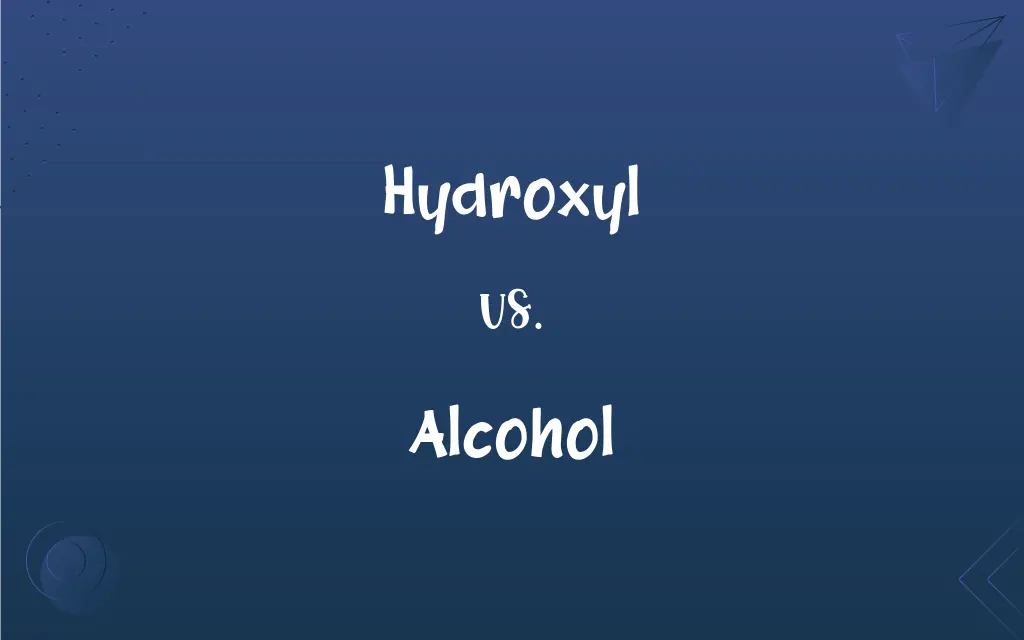Hydroxyl vs. Alcohol: What's the Difference?
Edited by Harlon Moss || By Janet White || Published on December 27, 2023
Hydroxyl is a functional group (-OH) in organic chemistry. Alcohol is an organic compound with a hydroxyl group bonded to a carbon atom.

Key Differences
Hydroxyl refers to an -OH group in organic chemistry, essential in many molecules. Alcohol is a broader term, describing a type of organic compound that includes a hydroxyl group bonded specifically to a carbon atom.
In hydroxyl groups, oxygen and hydrogen are bonded together. In alcohols, this hydroxyl group is attached to a carbon atom, often part of a larger organic structure.
Hydroxyls are not standalone molecules but are part of larger compounds. Alcohols, such as ethanol or methanol, are complete molecules with specific properties and uses.
The presence of a hydroxyl group can influence the chemical behavior of a molecule. Alcohols exhibit properties like solubility in water and reactivity due to their hydroxyl group.
Hydroxyl groups play a role in forming substances like alcohols, acids, and esters. Alcohols are one of the most common types of organic compounds, used in everything from beverages to solvents.
ADVERTISEMENT
Comparison Chart
Definition
Functional group (-OH) in organic chemistry.
Organic compound with a hydroxyl group on carbon.
Molecular Structure
Part of a larger molecule, not a standalone entity.
Complete molecule with distinct properties.
Chemical Behavior
Influences properties of the host molecule.
Exhibits specific properties like solubility.
Types of Compounds Formed
Involved in creating alcohols, acids, and esters.
Includes types like ethanol, methanol.
Usage
Integral in various organic reactions.
Used in beverages, solvents, and as a fuel.
ADVERTISEMENT
Hydroxyl and Alcohol Definitions
Hydroxyl
Hydroxyl is a functional group consisting of an oxygen atom bonded to a hydrogen atom (-OH).
The hydroxyl group in alcohols determines many of their reactions.
Alcohol
Alcohol is an organic compound with one or more hydroxyl groups attached to a carbon atom.
Ethanol, found in alcoholic beverages, is a common type of alcohol.
Hydroxyl
Hydroxyl is essential in organic chemistry for creating various compounds.
Hydroxyl groups are involved in the formation of esters.
Alcohol
Alcohols vary in complexity from simple methanol to complex forms.
Glycerol, a type of alcohol, is used in food and pharmaceuticals.
Hydroxyl
Hydroxyls influence the chemical properties of the molecules they are part of.
The hydroxyl group affects the solubility of organic compounds in water.
Alcohol
Alcohols are used as solvents, fuels, and in beverages.
Isopropyl alcohol is used as a disinfectant.
Hydroxyl
Hydroxyl is a common group in organic compounds.
Phenols contain a hydroxyl group attached to an aromatic ring.
Alcohol
The chemical properties of alcohols include reactivity and solubility.
Ethanol is soluble in water and reacts with acids to form esters.
Hydroxyl
Hydroxyl groups are part of larger organic molecules.
Carboxylic acids contain both a hydroxyl and a carbonyl group.
Alcohol
Alcohols are important in various industrial and medical applications.
Ethanol is used as a biofuel.
Hydroxyl
The univalent group OH, a characteristic component of bases, certain acids, phenols, alcohols, carboxylic and sulfonic acids, and amphoteric compounds.
Alcohol
Any of a series of hydroxyl compounds, the simplest of which are derived from saturated hydrocarbons, have the general formula CnH2n+1OH, and include ethanol and methanol.
Hydroxyl
(chemistry) A univalent radical or functional group (–OH) in organic chemistry; present in alcohols, phenols, carboxylic acids and certain other classes of compounds.
Alcohol
A colorless volatile flammable liquid, C2H5OH, synthesized or obtained by fermentation of sugars and starches and widely used, either pure or denatured, as a solvent and in drugs, cleaning solutions, explosives, and intoxicating beverages. Also called ethanol, ethyl alcohol, grain alcohol.
Hydroxyl
A compound radical, or unsaturated group, HO, consisting of one atom of hydrogen and one of oxygen. It is a characteristic part of the hydrates, the alcohols, the oxygen acids, etc.
Alcohol
Intoxicating beverages containing ethanol considered as a group
The national consumption of alcohol.
Hydroxyl
The monovalent group -OH in such compounds as bases and some acids and alcohols
Alcohol
Any of a class of organic compounds (such as ethanol) containing a hydroxyl functional group (-OH).
Alcohol
(colloquial) Ethanol.
Alcohol
(uncountable) Beverages containing ethanol, collectively.
Alcohol
(obsolete) Any very fine powder.
Alcohol
An impalpable powder.
Alcohol
The fluid essence or pure spirit obtained by distillation.
Alcohol
Pure spirit of wine; pure or highly rectified spirit (called also ethyl alcohol or ethanol, CH3.CH2.OH); the spirituous or intoxicating element of fermented or distilled liquors, or more loosely a liquid containing it in considerable quantity. It is extracted by simple distillation from various vegetable juices and infusions of a saccharine nature, which have undergone vinous fermentation.
Alcohol
A class of compounds analogous to vinic alcohol in constitution. Chemically speaking, they are hydroxides of certain organic radicals; as, the radical ethyl forms common or ethyl alcohol (C2H5.OH); methyl forms methyl alcohol (CH3.OH) or wood spirit; amyl forms amyl alcohol (C5H11.OH) or fusel oil, etc.
Alcohol
A liquor or brew containing alcohol as the active agent;
Alcohol (or drink) ruined him
Alcohol
Any of a series of volatile hydroxyl compounds that are made from hydrocarbons by distillation
FAQs
Do hydroxyl groups make compounds more soluble in water?
Yes, hydroxyl groups generally increase solubility in water.
Are all hydroxyl-containing compounds alcohols?
No, only compounds with a hydroxyl group bonded to a carbon atom are alcohols.
What is a hydroxyl group?
A hydroxyl group is an -OH functional group in organic molecules.
What is an alcohol in chemistry?
An alcohol is an organic compound with a hydroxyl group attached to a carbon atom.
Are alcohols acidic or basic?
Alcohols are generally neutral but can act as weak acids.
Can alcohols form hydrogen bonds?
Yes, alcohols can form hydrogen bonds due to their hydroxyl groups.
Is the hydroxyl group polar?
Yes, the hydroxyl group is polar.
Are hydroxyl groups found in sugars?
Yes, sugars contain multiple hydroxyl groups.
What are the uses of alcohols?
Alcohols are used in beverages, solvents, fuels, and antiseptics.
What are the types of alcohols?
Alcohols include primary, secondary, and tertiary, based on the carbon atom's bonding.
Do alcohols have a high boiling point?
Alcohols generally have higher boiling points due to hydrogen bonding.
Can hydroxyl groups participate in chemical reactions?
Yes, hydroxyl groups are reactive in various chemical reactions.
Do hydroxyl groups affect molecule polarity?
Hydroxyl groups increase the polarity of molecules they are part of.
Are alcohols flammable?
Many alcohols, like ethanol, are flammable.
Is a hydroxyl group the same as a hydroxide ion?
No, a hydroxyl group is covalently bonded in a molecule, whereas a hydroxide ion is a separate, negatively charged ion (OH-).
How do hydroxyl groups interact with other functional groups?
Hydroxyl groups can influence the reactivity and properties of other functional groups in a molecule.
What role do hydroxyl groups play in acids?
Hydroxyl groups are part of carboxylic acids, contributing to their acidic nature.
Can alcohols be synthesized in the laboratory?
Yes, alcohols can be synthesized through various chemical reactions.
Can alcohols be converted into other compounds?
Yes, alcohols can be chemically transformed into esters, ethers, and halides.
What is the simplest alcohol?
The simplest alcohol is methanol (CH3OH).
About Author
Written by
Janet WhiteJanet White has been an esteemed writer and blogger for Difference Wiki. Holding a Master's degree in Science and Medical Journalism from the prestigious Boston University, she has consistently demonstrated her expertise and passion for her field. When she's not immersed in her work, Janet relishes her time exercising, delving into a good book, and cherishing moments with friends and family.
Edited by
Harlon MossHarlon is a seasoned quality moderator and accomplished content writer for Difference Wiki. An alumnus of the prestigious University of California, he earned his degree in Computer Science. Leveraging his academic background, Harlon brings a meticulous and informed perspective to his work, ensuring content accuracy and excellence.






































































